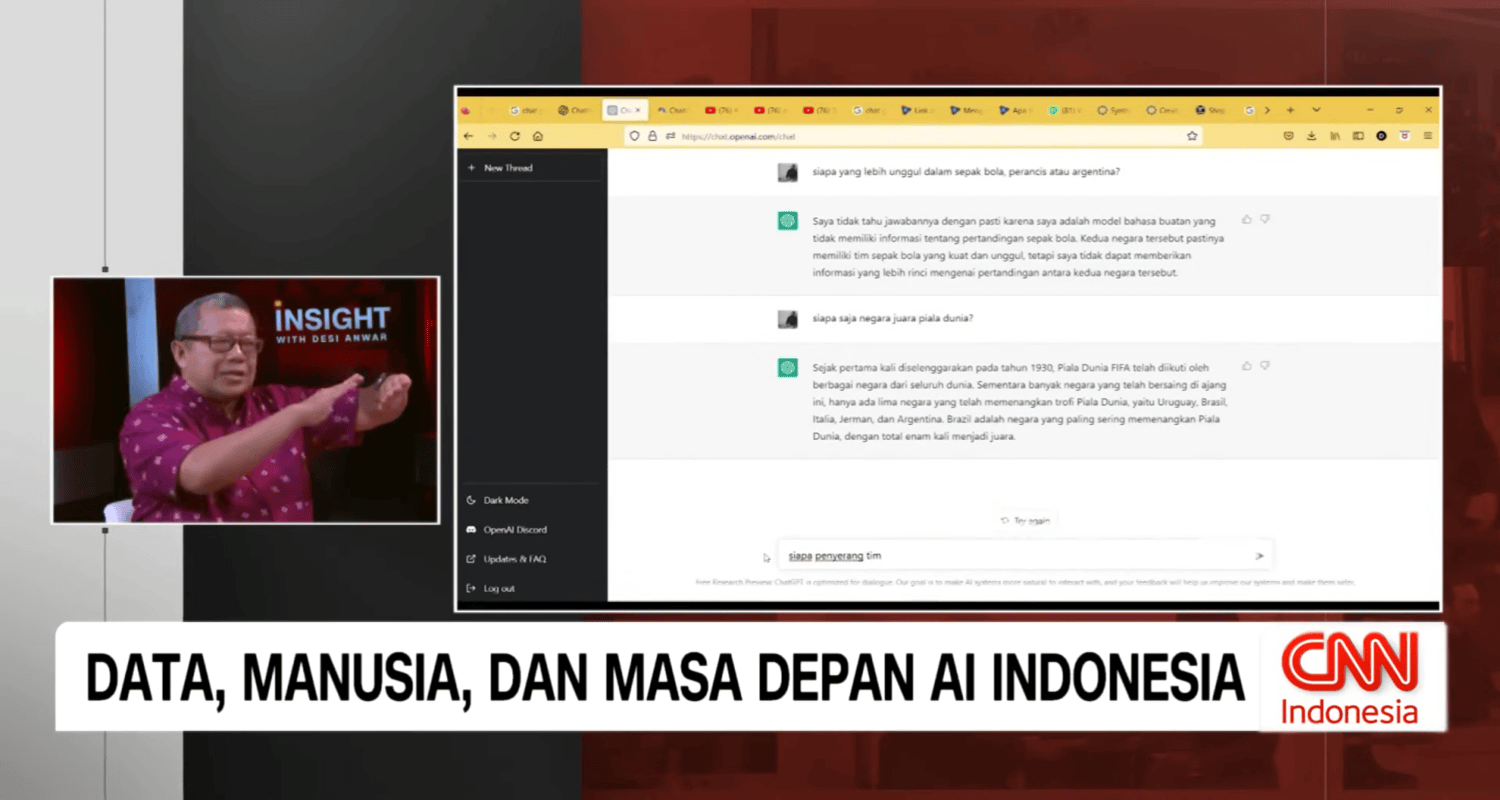Indonesia is currently
undergoing a massive transformation in the field of technology, especially with
the emergence of Artificial Intelligence (AI) which is increasingly changing
various sectors, from industry to public services. This development brings
great opportunities, but also presents significant challenges, particularly in
terms of data security, regulation, and the ethics of technology use.
In Inside with Desi
Anwar, attended by Ono W Purbo, Rector of the South Tangerang Institute of
Technology and one of the key figures in the development of the internet in
Indonesia, they discussed how Indonesia can make better use of advances in AI.
In this episode, they talked about the challenges Indonesia faces in adopting
AI technology, as well as the importance of preparing human resources (HR) that
can support this development in the future.
AI Development in
Indonesia: Between Opportunities and Challenges
Sectors such as
healthcare, manufacturing, and even everyday life are beginning to feel the
impact of artificial intelligence. AI is now used to analyze medical images for
disease detection, automate production processes, and even in our smartphones,
AI-based virtual assistants have become commonplace. However, Indonesia still
lags behind neighboring countries such as Singapore in terms of AI
implementation.
Based on the regional AI index, Indonesia scored 61.03, far below Singapore's 81.97. Nevertheless, Ono Purbo emphasized that Indonesia has great potential in terms of local AI development, as has been demonstrated by various communities and academics in the country.
The Importance of Data
and Infrastructure to Drive AI Development
As a country with the
largest internet community in the world with more than 60,000 RTRWNet,
Indonesia shows great potential for digital technology development. However,
the biggest challenge lies in data quality and management. Much of the
government's data is still in physical form, which certainly hinders the
effective use of AI. One of the proposed solutions is to build a secure local
data infrastructure that does not depend on foreign servers.
In addition, better
data management is also key to reducing bias in AI. For example, AI can be very
biased if the data used does not cover the diversity that exists in Indonesia,
as is the case with the recognition of regional specialties.
Human Resources and
Education: The Key to Facing the AI Era
Although Indonesia has
great potential for AI development, competent human resources remain a major
problem. Indonesia needs around 60,000 teachers who can teach AI in depth, not
just skills in using software or applications. As part of the solution, universities
in Indonesia, such as the South Tangerang Institute of Technology, have begun
to develop AI modules that are distributed free of charge to students and
teachers.
Ono Purbo emphasizes
the importance of digital literacy and computational thinking skills from an
early age. In addition, the younger generation needs to be taught not only to
be consumers of technology, but also producers who are capable of developing technology,
creating applications, and providing real solutions to social and economic
problems.
AI and Ethics:
Challenges in Its Use
On the other hand, the
application of AI also requires attention to ethical aspects. The misuse or
uncontrolled use of AI can have negative impacts, such as AI hallucinations
that provide inaccurate answers or information. This can threaten the academic,
medical, and many other sectors.
Indonesians need to be
given a better understanding of how AI works and its potential dangers. This
technology can be a very useful tool if used wisely, but it can also backfire
if not properly regulated.
Conclusion: Enhancing
Collaboration and AI Literacy in Indonesia
To avoid a digital
divide that could trigger social and economic inequality, Indonesia needs to
improve digital literacy, build independent infrastructure, and prepare
competent human resources to master AI technology. This is not only the
responsibility of the government, but also the academic world and the private
sector, which need to collaborate to create an inclusive and sustainable
technology ecosystem.
As a country with
great potential in AI development, Indonesia has the opportunity to become a
leader in the application of this technology in Southeast Asia. However, the
first crucial step is to strengthen the foundation of education, establish the
right infrastructure, and uphold ethics in the application of AI for a brighter
and more productive future.
 English
English
 Indonesia
Indonesia



Comments
Dan naskah ini dibuat oleh AI 😀
Apa yg disampaikan diatas sangat benar lebih khusus kami orang asli Papua harus diberikan banyak pelatihan AI.
Add New Comment